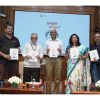Reforming Indian Education: Cultivating Minds, Not Just Marks
– Devansh Asawa and Dr. Vipin Sreekumar
India operates one of the world’s largest schooling systems, serving 265 million students across 1.5 million institutions. Of these, about 0.4 million are private schools affiliated mostly to CBSE or State Boards. Each year, millions of students prepare for exams such as JEE and NEET, competing for limited seats in IITs and AIIMS where acceptance rates are more adverse than at Harvard and Stanford.
While schools are effective in preparing students for examinations, they often fall short in developing independent thinking. Across CBSE, ICSE and State, learning is still largely equated with memorisation, previous exam-paper practice and extended coaching. This supports exam performance but limits the development of critical thinking, real-life problem-solving, cross-disciplinary understanding and stronger communication. Many high-scoring students struggle with analytical and leadership skills in real world.
IB’s Holistic Model: The International Baccalaureate (IB) is expanding in this context. Parents seeking skill-focused education are driving an 11 percent CAGR(Compound Aggregate Growth Rate) for IB programmes in India, according to an EY-Parthenon report. The India–UK Free Trade Agreement has opened the door for schools such as Wellington and Harrow to establish local branches, supported by private investment and expansion by domestic operators.
IB’s inquiry-based approach focuses on research, reflection and project-driven assessments. Students are encouraged to link concepts across subjects. Instead of working through a set of maths questions, for instance, they might develop a city budget drawing on mathematics, economics, civics and ethics. An Oxford University study found that IB students scored higher on critical-thinking measures than those from other curricula and entered university with stronger research and writing skills.
However, more than 90 percent of Indian students remain within CBSE or ICSE systems, largely due to the cost of IB programmes and the entrenched belief that exam preparation is the most reliable path to opportunity.
Embedding IB-Aligned Skills in Mainstream Schools: A full transition to IB is unlikely. Instead, experts argue that CBSE and ICSE schools can integrate IB-aligned skills through in-school tools, specialised summer programmes and self-paced digital platforms. Of these, in-school tools have seen the strongest uptake as they align directly with the syllabus and do not depend heavily on parental supervision.
Several startups are working in this space. They offer design-thinking modules to schools, provides DIY science kits combined with digital lessons, guides students in building ventures. They also focus on hands-on tinkering through workshops and kits. Some even target communication and public-speaking skills through a subscription model.
While such initiatives support STEM and communication, a broader opportunity remains for ventures that address core IB-aligned competencies such as design thinking, interdisciplinary learning, student-led research, creativity and global awareness—particularly in Tier 2 and Tier 3 markets where demand for holistic education is rising.
Artificial Intelligence is accelerating this shift. AI-enabled systems can adapt lessons to individual students, supporting differentiated and self-paced learning. Platforms such as Kyron Learning create customised course materials. Tools like Sainaptic AI and Brisk Teaching automate grading and feedback, reducing administrative load on teachers. Algor converts text, images or audio into ready-made presentations, flashcards and quizzes.
This technology can bring advanced learning approaches to mainstream schools at scale. A student in Gorakhpur could design a solar-powered water pump with guidance from an AI tutor. A Class 9 student in Udaipur could produce a climate-change podcast with AI-supported scripting and editing. A school in Bhopal could run weekly interdisciplinary projects with AI-generated resources.
Examinations will remain important in India, yet the future demands stronger skills in critical thinking, communication, creativity and adaptability. Strengthening the current system with IB-style frameworks, AI-enabled personalisation and teacher-centric tools offers a practical path forward.
As India prepares for its demographic opportunity, equipping students with both knowledge and skills will be essential. The goal is not to replace existing curricula, but to ensure that every student has access to learning that prepares them for a rapidly changing world.
Devansh Asawa is a third-year undergraduate student at Masters’ Union, Delhi. Dr Vipin Sreekumar is an Associate Professor of Strategy and Entrepreneurship at Masters’ Union and holds a PhD from IIM Calcutta.
Also Read: Beyond Board Marks: How India’s Universities Are Redefining Merit
















Add comment